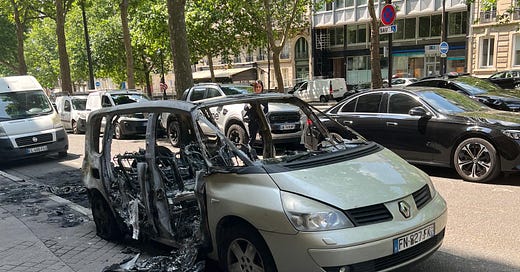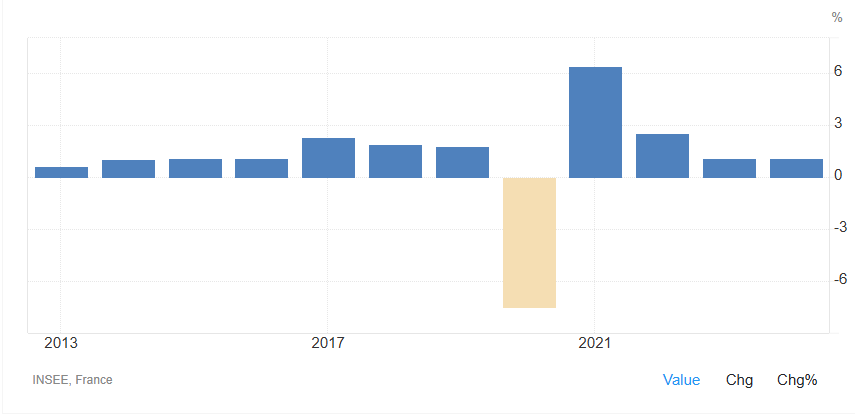Civil Unrest Hits France, Raises Security Concerns among Businesses, Consumers
Allianz Commercial poll shows that over 50% of company respondents ranked civil unrest as biggest concern globally
Civil unrest has rocked France this summer, with the latest bout of violence breaking out this month after an annual music festival.
Syringe attacks and riots marred the festival, which marks the summer solstice with about five million people dancing and listening to performances on June 21 at the Fête de la Musique. About 145 people were reportedly stabbed with syringes, 13 of which occurred in Paris, and more than 370 people were arrested.
"Some victims were taken to the hospital for toxicological tests," France’s Interior Ministry said on June 22. A series of posts circulated on social media before the festival calling for the targeting of women.
France has experienced a wave of youth-driven social unrest since May that has dampened business confidence in Europe’s second-largest economy. On May 31, violence erupted in Paris after a soccer match that damaged shops and destroyed private property.

French President Emmanuel Macron described the riots as "unacceptable" and stated that those involved would be identified and punished. France’s Interior Minister Bruno Retaillleau described on X the rioters as “barbarians” who “have taken to the streets of Paris to commit crimes and provoke law enforcement.”
Civil Unrest Top Concern for Businesses Globally, France
Civil unrest has become a top concern for businesses globally, “with France being a hotspot,” Allianz Commercial analysts wrote on April 9. More than 50% of company respondents ranked civil unrest as their biggest concern, with 80,000 protests and riots expected in 2024, according to Allianz.
“Economics by mismanagement, corruption, and continually rising disparity between the ‘rich’ and the rest” is driving the unrest, Srdjan Todorovic, Head of Political Violence and Hostile Environment Solutions at Allianz Commercial, said.. “Those in the immediate vicinity of unrest can suffer business interruption losses and material damage,” Todorovic added.
The French economy is facing a period of stagnation, with GDP growth expected to remain weak at just 0.6% in 2025, and unemployment is projected to rise to 7.7%. All major growth engines —consumer spending, investment, government demand, and foreign trade—have stalled, Le Monde noted on June 19.
Household savings remain at historic highs. An INSEE March survey revealed that over 40% of households are saving money, while 70% have begun to curb their consumption.
“The French economic situation remained difficult at the end of the second quarter, and economic growth is still very weak,” ING Think wrote on June 20. “Domestic consumption remains sluggish, despite the fall in inflation, with households remaining particularly cautious and continuing to save much more than usual.
French Rioters Damage Local Businesses
During the riots on May 31, local businesses had their doors and windows smashed in, their facades defaced, and some were looted. In the Paris neighborhoods just off the Champs-Élysées, a hub for tourism and commerce, shards of glass littered the streets.
The police had deployed 5,400 officers ahead of the match between Paris Saint-Germain Football Club’s (PSG) and Italy’s Inter Milan, in anticipation of potential unrest on May 31. After the game, police in riot gear clashed with masked and hooded mobs hurling projectiles, launching fireworks, setting barricades alight, and attacking first responders.
By the early hours of June 1, police had arrested 559 individuals across France, 491 in Paris. Rioters injured multiple police officers.
“They simply came to the Parc des Princes and the Champs-Élysées to commit atrocities, loot, and attack the police,” Paris Police Prefect Laurent Nunez told Le Parisien in a June 2 interview.
French Polls Show Increase in Concerns about Security
French conservative newspaper Le Figaro reported on June 23 that 86% of individuals it polled “believe that the justice system should impose harsher sentences on juvenile offenders.” About 91% of respondents said they “believe that insecurity has increased in recent years,” the newspaper reported.
“There is a big difference between Paris 20 years ago and Paris today,” Hubert Geay, head of grip fittings at the local usGolf shop in Paris, told European Capital Insights (ECI). He and usGolf manager, Thierorey Bonhomme, hired a private security guard with a trained dog to protect their shop.
Others interviewed criticized the police for their failure to prevent the riots.
“What do we have to do to stop it?” Nicolas, a manager at a wine franchise who declined to give his last name, said. “This is not the first time this has happened. It’s predictable, and that’s the real scandal.”
Police Chief Nunez defended the city’s security preparations. “We prevented a lot of damage,” he said. He pointed to “a societal problem” as the cause of the unrest and called on “all stakeholders” to address the issues.
Politicians Call Out Foreigners Rioting
The country’s civil unrest has deepened concerns about immigration. A June 11 report from pollster Elabe found that only 21% of participants rely on Macron to take “effective action against juvenile violence and address its underlying causes,” compared to 42% trust in Marine Le Pen, leader of the right-wing National Rally (RN) party.
Support for the anti-immigration party, the RN, has increased in recent years. The party won 30 seats in the 2024 European Union Parliament election, compared to Macron’s coalition, which won only 13.
“More scenes of riots in Paris,” right-wing French politician, writer, and former broadcast political commentator Éric Zemmour said on June 1. “But be careful, you absolutely must not ask the touchy question: where do these people come from? And why are they still here?”
Gilles Platret, Mayor of Chalon-sur-Saône, a town in the Bourgogne-Franche-Comté department in eastern France, both asked and attempted to answer this question.
“After the legitimate celebrations by Parisian fans,” others came and “seized the opportunity to create disorder with a political motive,” Platret wrote in a June 1 statement. “The Palestinian flag has become the symbol of the rioters, the rallying sign of Islamist gangs determined to defy republican institutions.”






